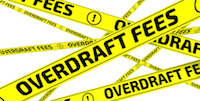 Consumers can opt out of the overdraft protections but many are unaware of their options or unaware they have opted in until they check their bank accounts.
Consumers can opt out of the overdraft protections but many are unaware of their options or unaware they have opted in until they check their bank accounts.“The main purpose of overdraft fees is for something like a check that you don’t want to bounce as an occasional courtesy but not as a routine method of charging consumers dozens of extra fees every year and bringing in large revenues for the banking industry,” says Lauren Saunders, a Harvard law school and associate director of The National Consumer Law Center (NCLC) in Washington D.C.
The NCLC recently filed an amicus brief in the case of Roberts v. Capital One Financial Corporation that alleged the bank misled customers when charging overdraft fees. The NCLC said, “Over the last 15 to 20 years, many financial institutions have betrayed the trust of their account holders by replacing what was once an occasional accommodation with an exploitative system of routine high-cost overdraft fees that drive account holders deep into debt. The fees are so lucrative for banks, particularly on debit card transactions, that banks push them on customers and misrepresent the purported benefits of overdraft products and how they work.”
Pew’s December 2017 study looked at bank revenue information as reported to the Federal Deposit Insurance Corp. (FDIC) from 1984 to 2015, and examined the fee schedules, account agreements, and supplemental disclosures of 44 of the nation’s 50 largest banks.
The median overdraft fee, according to Pew, is $35. Even if the bank customer only bought a coffee at Starbucks if the cost exceeded the amount of money in the account it would trip an overdraft fee.
“Essentially those fees are charged on debit and ATM cards that could simply denied with no fee at all if there is not enough money in the account. People are deceived into permitting the cards to be overdrawn,” says the NCLC’s Lauren Saunders. “Instead of offering affordable other kinds of loans or affordable lines of credit they offer a very high cost credit product in the form of overdraft fees.”
On average, the consumers with debit cards subject to overdraft fees pay $250 a year in overdraft fees. The people the most affected are those who are already having financial troubles. According to Pew’s survey of 1008 participants “74 percent of “overdrafters” said they had trouble meeting their monthly bills.” The study reports that 7 out of 10 “overdrafters” made less than $50,000 a year.
Many financial institutions have practiced “re-ordering” of debit transactions. The largest transactions are processed first in order to drain the account faster and trip the overdraft fees.
There have been a number of recent class actions suited related to re-ordering which has eliminated some of those practices but overdraft fees continue to make up huge bank revenues.
In October, 2017 the Bank of America agreed to pay $37.5 million in a class action lawsuit to customers who were charged $35 overdraft fees and extended overdraft fees. The bank also undertook to contact credit bureaus regarding customers who had their credit rating negatively affected.
Although it is not against the law to charge an overdraft fee the court ruled the size of the fees amounted to predatory lending. Consumers were being charged huge interest for being overdrawn a few dollars.
READ MORE EXCECESSIVE OVERDRAFT FEE LEGAL NEWS
“We think that overdraft fees should have no place on debit and ATM cards – if there is not enough money then the transaction should just be declined like they used to be. The consumer can then use cash or another payment method or skip the purchase,” says Saunders.
Recent changes to class action lawsuit regarding arbitration is making it harder for consumers to sue. Both the NCLC and Pew have lobbied the Consumer Financial Protection Bureau (CFPB) to make changes that protect consumers from aggressive banking practices with respect to overdraft fees. However, with a change in leadership at the CFPB any future changes are hard to predict.

READER COMMENTS
Linda Murphy
on
Jacquelyn D Keyes
on